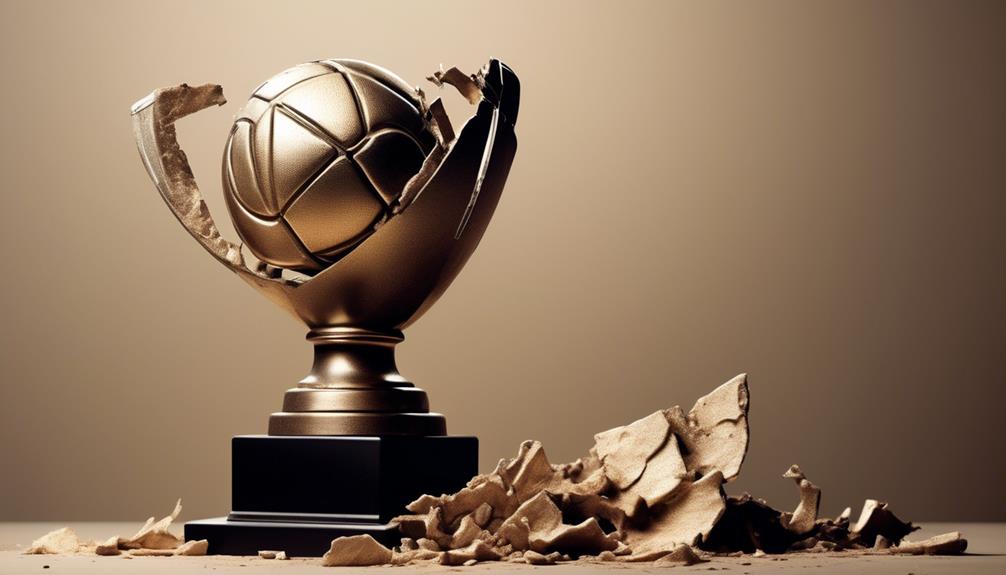Four Impacts of Unethical Actions in Sports
When it comes to the world of sports, unethical actions can be like a crack in the foundation of a once sturdy building. The impacts of such actions ripple through the entire sports community, affecting not only the athletes involved but also the fans, sponsors, and the integrity of the game itself.
From erosion of trust to financial losses and legal ramifications, the consequences are far-reaching and often long-lasting. But there's more to it than meets the eye.
Erosion of Trust

When unethical actions occur in sports, they erode the trust that fans and participants have in the integrity of the game. The impact on fans is significant. Fans invest not only their time and money but also their emotions into sports. They look up to athletes as role models and draw inspiration from their dedication, hard work, and sportsmanship. However, when athletes engage in unethical behavior such as doping or match-fixing, it shatters the fans' belief in the fairness and authenticity of the competition. This erosion of trust can lead to disillusionment and disengagement among fans, affecting the overall enjoyment and support for the sport.
Consequently, the consequences for sponsors can be detrimental. Sponsors invest in sports to gain exposure, enhance their brand image, and connect with their target audience. However, when unethical actions tarnish the reputation of a sport, sponsors may reconsider their association. They don't want their brand to be linked with scandals or controversies that could damage their public image and credibility. As a result, sponsors may withdraw their financial support, impacting the financial stability of the sport and its ability to organize events and support athletes.
Damage to Reputation
The unethical actions in sports can severely damage the reputation of athletes, teams, and governing bodies, impacting their credibility and public perception. When athletes or teams are involved in unethical behaviors such as doping, match-fixing, or cheating, the public's trust is eroded, and their reputation takes a significant hit. The public's perception of the individuals or teams involved can shift dramatically, often leading to a loss of support and admiration.
Damage to reputation in sports can have lasting effects, making it difficult for athletes or teams to regain the trust and respect they once enjoyed. This tarnished reputation not only affects the individuals or teams directly involved in the unethical actions but can also cast a shadow of doubt over the entire sport or governing body. Fans and sponsors may become disillusioned, leading to financial repercussions and a decline in support for the sport as a whole.
Rebuilding a damaged reputation in sports is a challenging and lengthy process. Reputation repair efforts may involve public apologies, disciplinary actions, and demonstrated commitment to ethical behavior. However, even with these efforts, the stain of unethical actions can linger, impacting future opportunities and public perception.
It's crucial for athletes, teams, and governing bodies to be proactive in addressing unethical behaviors and implementing measures to prevent future incidents in order to rebuild trust and repair their damaged reputation.
Impact on Athlete's Career
Unethical actions in sports can significantly derail an athlete's career, impacting their opportunities, endorsements, and public perception. When an athlete engages in unethical behavior, it can have a detrimental effect on their endorsements. Companies and brands may distance themselves from the athlete, leading to the loss of lucrative sponsorship deals. This not only affects their current income but also their future earning potential.
Additionally, the public perception of the athlete may suffer, leading to a loss of trust and admiration from fans and the broader community.
Moreover, unethical actions in sports can result in severe performance consequences. When an athlete is involved in unethical behavior, it can lead to suspensions, fines, or even bans from competitions. This directly affects their ability to train, compete, and showcase their skills, ultimately impacting their performance and results.
Furthermore, the psychological impact of facing the fallout from unethical actions can also affect an athlete's focus, motivation, and mental well-being, further hampering their performance and career progression.
Financial Losses
Experiencing financial losses is a direct consequence of engaging in unethical actions in sports. When an athlete or team is involved in unethical behavior, there are significant economic repercussions.
Sponsors are often quick to distance themselves from individuals or organizations that bring negative attention to the sport. As a result, sponsorship consequences can be severe, leading to the loss of lucrative endorsement deals and financial support.
Moreover, the economic repercussions extend beyond lost sponsorships. Events and competitions may choose to exclude individuals or teams involved in unethical actions, leading to missed opportunities for prize money and appearance fees.
Additionally, the tarnished reputation of those involved can impact ticket sales and merchandise revenue. Fans may choose to disengage from supporting athletes or teams that have been associated with unethical behavior, leading to a decline in revenue streams such as ticket sales, broadcast rights, and merchandise sales.
Legal Ramifications
Athletes and teams engaging in unethical actions in sports may face legal ramifications, including fines, suspensions, and even criminal charges. When unethical behavior crosses the line into criminal activity, athletes and teams can find themselves facing serious consequences. Criminal charges can be brought against individuals for actions such as doping, match-fixing, or physical assault during games. These charges can result in hefty fines, imprisonment, and irreparable damage to one's reputation.
Additionally, unethical actions in sports can lead to civil lawsuits. For example, if a player injures an opponent intentionally, the injured party may choose to file a civil lawsuit for damages. This can result in significant financial losses for the individual or team responsible for the unethical behavior. Moreover, teams and organizations may also face lawsuits for negligence in allowing unethical behavior to occur within their ranks.
In some cases, legal ramifications can extend beyond individual athletes to encompass the entire team or organization. This can lead to collective fines, suspensions, or even the dissolution of a team or organization. The legal fallout from unethical actions in sports can have far-reaching implications, impacting not only the individuals directly involved but also their teammates, coaches, and the reputation of the sport as a whole.
Therefore, it's crucial for athletes and teams to uphold ethical standards to avoid the potential legal consequences that may arise from their actions.
Deterioration of Fair Play
The erosion of fair play in sports undermines the integrity of competitions and diminishes the values of sportsmanship and respect. When athletes engage in unethical actions, such as cheating or foul play, it creates an environment where the spirit of fair competition is compromised. This erosion of fair play not only taints the integrity of the game but also diminishes the fundamental principles of sportsmanship and respect that are essential for the overall spirit of sports.
Sportsmanship, which encompasses qualities such as honesty, respect for opponents, and fair play, is vital for the ethical foundation of sports. However, when fair play deteriorates, the very essence of sportsmanship is compromised. Athletes are expected to compete with integrity and adhere to the rules of the game, but when this erodes, it creates an unfair playing field that goes against the principles of healthy competition.
Furthermore, the erosion of fair play can have detrimental effects on the broader concept of competition. It distorts the outcomes of matches or events, leading to an imbalance in results and unjust advantages for those who engage in unethical actions. This not only undermines the credibility of the competition but also damages the trust and confidence of fans and supporters.
Undermining Team Cohesion

Undermining team cohesion stems from the erosion of fair play and can significantly impact the overall performance and dynamics of a team. When ethical conduct is compromised, it creates a ripple effect that hampers the unity and effectiveness of the team. Here's how it affects team dynamics and performance:
- Trust and Communication: Ethical misconduct can breed distrust among team members, leading to breakdowns in communication. When individuals within a team feel that others aren't playing by the rules, it can lead to an environment of suspicion and secrecy, hindering open and honest communication essential for teamwork.
- Accountability and Responsibility: Unethical actions can create an atmosphere where accountability and responsibility are diminished. This can lead to a lack of motivation and commitment within the team as individuals may feel that their efforts aren't valued equally. When team members feel that others aren't upholding ethical standards, it can create a sense of unfairness and disengagement.
- Performance and Morale: Ultimately, the impact of undermining team cohesion is reflected in the team's performance and morale. When the team isn't united due to ethical breaches, it can lead to a decline in performance, as the focus shifts from achieving collective goals to individual interests. This can result in a loss of motivation, team spirit, and a decrease in overall productivity.
Negative Influence on Youth
How can the unethical actions of sports figures negatively impact the youth?
When young individuals witness sports figures engaging in unethical behavior, it can have a detrimental effect on their moral development. These figures are often looked up to as role models, and when they display negative behavior, it can influence the youth to emulate such actions. This can lead to the normalization of unethical behavior among the younger generation, ultimately hindering their moral growth.
Sports figures who engage in unethical actions such as cheating, doping, or displaying poor sportsmanship can become negative role models for impressionable youth. When children and teenagers see their sports idols engaging in such behavior, it can desensitize them to the importance of fair play and ethical conduct. This can have long-lasting effects on their perception of right and wrong, as well as their understanding of the value of integrity in sports and in life.
Moreover, the negative influence of unethical actions in sports can extend beyond the individual level and permeate through youth sports teams and organizations. If young athletes witness professional players getting away with unethical behavior, it can erode the principles of teamwork, fairness, and respect within their own sporting environments.
Frequently Asked Questions
What Are the Specific Legal Consequences for Athletes and Teams Involved in Unethical Actions in Sports?
If you're involved in unethical actions in sports, legal consequences can be serious. Athlete accountability is crucial, as individuals and teams can face fines, suspensions, and even bans from competitions.
These actions can also result in civil lawsuits and damage to your reputation. It's important to uphold ethical standards to avoid these legal repercussions and maintain a positive image in the sports community.
How Do Unethical Actions in Sports Affect the Mental Health and Well-Being of the Athletes Involved?
Unethical actions in sports can have a significant impact on performance and athlete well-being. The psychological distress caused by such actions can affect an athlete's mental health and confidence, ultimately influencing their ability to compete at their best.
Additionally, it can disrupt team dynamics, leading to decreased trust and camaraderie among teammates. These effects can create a toxic environment that hinders overall well-being and performance in the sports arena.
What Measures Can Be Taken to Prevent the Negative Influence of Unethical Behavior on Young Athletes and Fans?
To prevent the negative influence of unethical behavior on young athletes and fans, it's crucial to establish preventive measures.
Positive role models can set the right example and guide youth toward ethical behavior.
Additionally, media influence should be monitored to ensure that it promotes sportsmanship and integrity.
Are There Any Long-Term Effects on the Community and Fans of a Team That Has Been Involved in Unethical Actions?
Long-term impact of unethical actions in sports can be significant. Fan loyalty may waver, affecting team revenue and morale.
Community trust in the team can erode, impacting local businesses and overall morale.
Team reputation may suffer, leading to decreased sponsorships and opportunities.
It's crucial to address unethical behavior swiftly and transparently to mitigate these effects and rebuild trust.
Open communication and ethical leadership are essential to regaining support and restoring the team's reputation.
How Do Unethical Actions in Sports Impact the Overall Integrity and Credibility of the Sport Itself?
Unethical actions in sports have a significant impact on the overall integrity and credibility of the sport itself. Such actions tarnish the reputation of the sport, eroding trust and respect from fans and the broader community.
Fan disillusionment sets in, leading to decreased interest and support. Restoring the sport's integrity becomes a challenging task, and rebuilding trust takes time and effort.
Ultimately, the sport suffers from a loss of credibility and integrity.
Conclusion
So, as you can see, unethical actions in sports can have far-reaching consequences. They can erode trust, damage reputations, and lead to financial losses and legal ramifications.
These actions can also have a negative impact on an athlete's career and undermine the principles of fair play. Additionally, they can have a detrimental effect on team cohesion and serve as a negative influence on youth.
It's important to always strive for integrity and ethical behavior in sports to avoid these damaging impacts.
